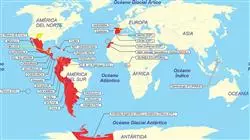University certificate
The world's largest faculty of journalism and communication”
Introduction to the Program
Become an excellent journalist and learn how to tell what is happening in the world”

Journalism studies are one of the most demanded in all universities, since this profession has a great influence on the population and has gained great prominence since its beginnings. Journalism encompasses different branches: social, cultural, economic, sports, international, events, conflicts, etc. This makes it necessary for professionals in this field to specialize in order to tell stories in the most appropriate way in each case.
Additionally, the transmission of information can be carried out through different media. Specifically, this program aims to specialize students in Spanish Language. To do so, it is necessary to acquire a series of skills that allow you to put into practice all that has been learned.
The syllabus covers everything related to the Spanish Language: semiotics, phonetics, morphology, syntax and semantics, among other aspects.
The only way to communicate in the most accurate way possible is to know a language in depth.
This program is the most complete and directed so that the professionals in the field of Journalism and Communication reach a higher level of performance, based on the fundamentals and the latest trends in Journalism. Take advantage of the opportunity and become a professional with solid foundations through this academic program and the latest educational technology 100% online.
This program will allow you to improve your skills and become a successful journalist”
This Postgraduate certificate in Spanish Language contains the most complete and up-to-date program on the market. The most important features include:
- Practical case studies are presented by experts in Spanish Language
- The graphic, schematic, and practical contents with which they are created provide scientific and practical information on the disciplines that are essential for professional practice
- Practical exercises where the self-assessment process can be carried out to improve learning
- Special focus on innovative methodologies in the study of Spanish Language
- Algorithm-based interactive learning system for decision-making in the situations that are presented to the student
- Theoretical lessons, questions to the expert, debate forums on controversial topics, and individual reflection assignments
- Content that is accessible from any fixed or portable device with an Internet connection
Work with the best teaching professionals in this Postgraduate certificate with curricular value of excellence"
Its teaching staff includes professionals belonging to the world of journalism, who bring to this program the experience of their work, as well as recognized specialists from prestigious reference societies and universities.
Its multimedia content, developed with the latest educational technology, will enable the professional to contextual and situated learning, i.e., a simulated environment that will provide immersive learning immersive learning programmed to prepare in real situations.
This program is designed around Problem-Based Learning, whereby the professional must try to solve the different professional practice situations that arise throughout the program. For this purpose, the professional will be assisted by an innovative interactive video system developed by renowned experts in the field of Spanish Language and with great experience.
Don't miss the opportunity to increase your skills in Journalism thanks to the knowledge of the Spanish Language"

Learn the latest trends in Journalism and be the best in this field"
Syllabus
The structure of the contents has been designed by a team of professionals in journalism, aware of the relevance of current affairs in order to delve into the area of knowledge, to perform professional quality work through the new tools available.

This Postgraduate certificate in Spanish Language contains the most complete and up-to-date educational program on the market”
Module 1. Spanish Language
1.1. Language in Mass Media
1.1.1. Introduction
1.1.2. Features of Journalistic Language
1.1.3. Language in the Different Channels of Information Dissemination
1.1.4. Linguistic Responsibility of Communication Professionals
1.1.5. Style Guides: Definition and Function
1.1.6. Style Guides: Definition and Function
1.2. Semiotics
1.2.1. Introduction
1.2.2. Signs
1.2.3. Sign Systems: Codes
1.2.4. Linguistic Semiotics
1.2.5. Language, Dialect, Speech and Norms
1.3. Phonetics and Phonology of Spanish
1.3.1. Introduction
1.3.2. Phonetics and Phonology: Objective of Study
1.3.3. Spanish Vowel System: The Vowels of the Spanish Language
1.3.4. Spanish Consonant System: The Consonants of the Spanish Language
1.3.5. Vowel and Consonant Subsystems of Spanish
1.3.6. The Supra-segmental Elements: Stress and Intonation
1.3.7. The Spelling Rules: Main Changes in the New Orthography of the Spanish Language of the RAE (2010)
1.4. The Spelling Rules: Main Changes in the New Orthography of the Spanish language of the RAE (2010)
1.4.1. Introduction
1.4.2. Morphology and Units of Morphological Analysis: Words, Morphemes and Lexemes
1.4.3. Inflectional Morphology
1.4.4. The Most Common Morphological Problems and Errors
1.5. Spanish Morphology: Derivational Morphology
1.5.1. Introduction
1.5.2. Formal Neological Mechanisms: Morphological Procedures of Word Formation in Spanish
1.5.3. Doubts Related to Word Formation
1.5.3.1. The Formation of the Plural in Compounds
1.6. Spanish Syntax: The Simple Sentence
1.6.1. Introduction
1.6.2. The Syntagma: Characteristics
1.6.3. Types of Syntagma
1.6.4. The Complements of the Verbal Nucleus: Syntactic Sentence Functions
1.6.5. Other Functions of Enunciation
1.6.6. Sentence Classification
1.6.7. Errors of a Syntactic Nature
1.7. Spanish Syntax: The Compound Sentence
1.7.1. Introduction
1.7.2. Coordination
1.7.3. Subordination
1.7.4. Errors of a Syntactic Nature (Compound Sentence)
1.8. Semantics and Lexicology of Spanish
1.8.1. Introduction
1.8.2. Terminological Distinctions: Meaning
1.8.3. Units of Semantic Analysis: The Componential Analysis of Meaning
1.8.4. The Cognitive Paradigm: The Theory of Prototypes
1.8.5. Semantic Relationships
1.8.6. Semantic Change
1.8.7. Lexicographic Tools: Dictionaries
1.9. Pragmatics of Spanish
1.9.1. Introduction
1.9.2. Basic Concepts of Pragmatics
1.9.3. Austin and Searle: The Theory of the Act of Speech
1.9.4. Grice: The Principle of Cooperation
1.9.5. Sperber and Wilson: The Theory of Relevance
1.9.6. Beyond Sentence Boundaries: The Utterance and the Text
1.10. Beyond Sentence Boundaries: The Utterance and The Text
1.10.1. Introduction
1.10.2. Spanish as a Network of Varieties
1.10.3. Diatopic Varieties of Spanish
1.10.4. Diastratic Varieties of Spanish
1.10.5. Diaphasic Varieties of Spanish
1.10.6. The Pan-Hispanic Standard of Spanish: Spanish as a Polycentric Language

A unique, key and decisive educational experience to boost your professional development"
Postgraduate Certificate in Spanish Language
If you have a passion for the Spanish language and are interested in deepening your knowledge in this field, the Postgraduate Certificate in Spanish Language offered by the Faculty of Journalism and Communication at TECH Global University is a unique opportunity. This virtual course will provide you with specialized education in the study of the Spanish language. Fluency in Spanish is essential in different professional fields, such as communication, translation, teaching and writing, among others. According to statistical data, Spanish is the second most spoken language in the world, with more than 460 million native speakers. This makes the study of the Spanish language a valuable skill in today's job market, with a growing demand for professionals trained in this field. This online course will allow you to access the contents from anywhere and at any time, adapting to your schedule and needs. You will have a team of expert teachers in the field of Spanish language, who will provide you with an up-to-date and high-quality education.
Specialize in Spanish language
The syllabus of the Postgraduate Certificate in Spanish Language addresses fundamental topics in the study of the language, such as grammar, syntax, phonetics, semantics and pragmatics. Through theoretical and practical approaches, the course will provide you with the necessary skills to analyze and understand Spanish rigorously and accurately, as well as to apply this knowledge in the writing and editing of Spanish texts. At the end of the course, you will obtain a certificate endorsed by TECH Global University, which will give you academic and professional recognition in the field of Spanish language. Expand your knowledge in this multidisciplinary field with TECH Global University's Postgraduate Certificate in Spanish Language. Enroll now and acquire the necessary skills to excel in the field of Spanish language!







